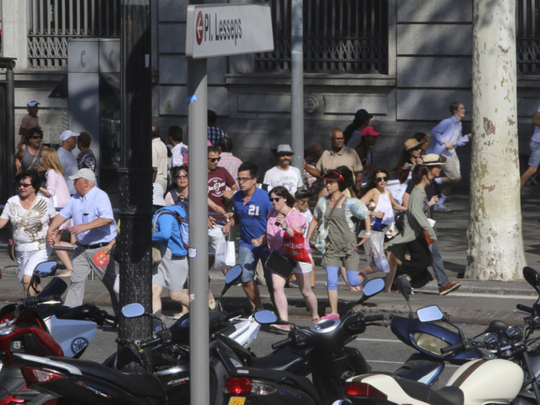
Barcelona, whenever we hear the name of this great Spanish city, waves of beauty, triumph and glory resonate in our minds.
For many of us, Barcelona reminds us of a great football club housing champions — FC Barcelona. Young kids, adults, and even senior citizens have so much passion and love for FC Barcelona.
Few weeks ago, Barcelona was in news when FC Barcelona’s superstar Neymar Jr. moved to Paris Saint-Germain for a world record transfer of $262 million (Dh961.5 million).
Today, Barcelona is all over the news again, but sadly in red tragic headlines.
Terror had struck the streets of Barcelona.
A van rammed into pedestrians in Las Ramblas, central Barcelona, killing 13 innocent and injuring at least 100 others. Spanish authorities soon confirmed it as a terrorist attack.
Terror denounced
The UAE was among the first countries to denounce this act of terror and condemn it.
The UAE affirmed its solidarity with the Spanish government in its fight against violence and extremism, said a statement released by the UAE Ministry of Foreign Affairs and International Cooperation.
Hours later, a second ramming attack terrorised residents of Spanish town of Cambrills, just 75 miles south of Barcelona, killing one woman and injuring six more.
The attack was carried out by five armed men, wearing fake suicide belts.
All five of them were later shot dead by the police in a dramatic shootout.
Several think tanks and counter-terrorism experts have analysed the root causes of such atrocities, and nearly all of them point towards the fundamentals: the extremist ideology.
It all usually springs from hate speeches and radicalisation of youth.
Europe, Spain in particular, needs to very carefully review each and every corner that promotes extremist ideology, preaches hate, and funds extremists.
All of this may be done in the shadow of European liberalism and free speech.
Extremist clerics
Extremist clerics usually paint a very untrue picture of many unfortunate events in the world — and then easily radicalise youth towards violence, resulting in terrorist attacks.
Today, there is a growing need for Europe to fight every extremist funder, promoter and preacher in and out of Europe.
Unfortunately, there has been a massive infiltration of Muslim Brotherhood ideologues in Europe.
They have established religious centres, non-profit affiliations, and charity organisations; many in the backdrop of supporting equality, representing Muslim minorities, and fighting for their rights who are supposedly “undermined” in Europe.
These causes may sound sympathetic, if Muslims are undermined in Europe; however, the work behind their closed doors remains a mystery especially in the absence of government vigilance.
This infiltration of Muslim Brotherhood terror ideologues in Europe was heavily sponsored and planned by the Qatari regime for years now, as Tarek Dahroug points out in his article on Ahram Weekly.
The fact remains that the spiritual leader of the terrorist organisation Muslim Brotherhood, Yousuf Al Qaradawi is still enjoying cool breezes of a safe haven granted by Doha inside Qatar.
Al Qaradawi is declared as a wanted terrorist by Saudi Arabia, UAE, Bahrain, and Egypt in a recent terror listing.
The UAE has been waging a war on terror for years now, and it is on forefront of promoting interfaith dialogue and tolerance.
In 2014, the UAE announced a list of terrorist organisations who funded and supported extremism.
Muslim Brotherhood is on top of UAE’s designated terror list.
The UAE also successfully fought some of the root causes of extremism by providing an excellent education system and a decent lifestyle for its citizens.
This brings stability, peace, and tolerance into society.
Today the UAE is one of the first Arab nations to establish centres to counter violent extremism and promote inter-faith dialogue.
Dialogue, communication
One of them is Hedayah, an Abu Dhabi-based International Centre of Excellence for Countering Violent Extremism.
Hedayah is dedicated to promote dialogue and communication, capacity building programmes, research and analysis to counter violent extremism in all forms and shapes.
Sawab Centre is another excellent centre that UAE has established in 2015. Launched jointly with the United States, Sawab is the first ever multinational online messaging and engagement programme in support of the Global Coalition Against Daesh.
Sawab also works with businesses, youth, religious leaders, and organisations to challenge Daesh’s doctrine of hate and intolerance, and promote the true values and diversity of Islam.
And then comes, the Muslim Council of Elders, an independent international body which brings leading scholars to promote accurate understanding of Islam and the real nature of tolerance that lies at its heart.
Muslim Council of Elders also hosts and participates in many inter-faith dialogue forums that promote a culture of openness, help address terrorism and extremist ideologies, and support peaceful coexistence.
These are some of the great examples of how UAE has been fighting extremism and radical groups that Europe must pick up at the earliest before it is too late.
Today we all stand against the terror that hit Barcelona and struck elsewhere; and pray for their victims.
Just like FC Barcelona strikes and wins back a match it’s losing, Barcelona must strike back on terrorism, score a goal, and win its match. Terror must be defeated.
— Hassan Sajwani is an Emirati writer. You can follow him on twitter @HSajwanization








